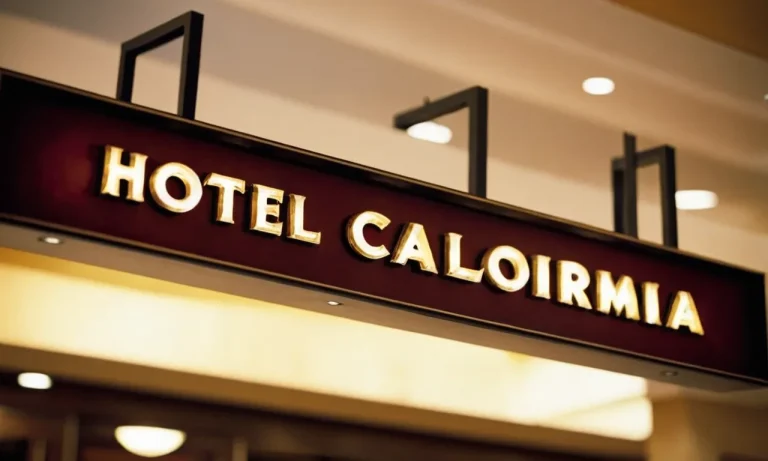Can You Transfer Hotel Reservations to Another Location?
Imagine you’ve meticulously planned your dream vacation, booked the perfect hotel, and then life throws you a curveball. Suddenly, you need to change your travel plans and wonder if it’s possible to transfer your hotel reservation to a different location.
This is a common dilemma faced by many travelers, and the answer is not always straightforward.
If you’re short on time, here’s a quick answer to your question: In most cases, you can transfer hotel reservations to another location, but the process and associated fees may vary depending on the hotel’s policies, the type of reservation, and the timing of the request.
In this comprehensive guide, we’ll explore the ins and outs of transferring hotel reservations, covering topics such as hotel policies, cancellation fees, and alternative options. Whether you’re a frequent traveler or planning a once-in-a-lifetime trip, this article will equip you with the knowledge to navigate this situation with ease.
Understanding Hotel Reservation Policies
When booking a hotel stay, it’s crucial to understand the reservation policies to avoid any unpleasant surprises or costly mistakes. Hotel reservation policies can vary significantly, so it’s essential to read the fine print carefully.
These policies outline the rules and restrictions regarding cancellations, modifications, and refunds, among other things.
Cancellation and Modification Policies
Most hotels have specific cancellation and modification policies in place. These policies typically outline the deadlines for making changes or cancellations without incurring fees or penalties. For example, some hotels may allow free cancellations or modifications up to 48 or 72 hours before the scheduled arrival date.
After that, you may be subject to cancellation fees or even charged for the entire stay. According to a study by Hotel News Resource, over 60% of hotels charge a cancellation fee ranging from $50 to $200 for late cancellations.
It’s crucial to familiarize yourself with these policies before booking to avoid unexpected charges. Some hotels may be more flexible than others, especially during low seasons or for loyalty program members.
Don’t be afraid to ask about their policies and see if they can accommodate any special requests or circumstances.
Non-Refundable vs. Refundable Reservations
Hotels often offer two types of reservations: non-refundable and refundable. Non-refundable reservations are typically cheaper but come with strict cancellation policies. If you cancel or modify a non-refundable reservation, you usually forfeit the entire amount paid.
On the other hand, refundable reservations are more expensive but provide greater flexibility. You can usually cancel or modify these reservations without penalty, as long as you do so within the specified timeframe.
According to Statista, in 2021, around 55% of hotel bookings in the United States were non-refundable. While non-refundable rates may seem tempting due to their lower prices, it’s essential to consider the potential risks and your flexibility needs before booking.
Advance Purchase Rates and Restrictions
Many hotels offer discounted rates for reservations made well in advance, often referred to as “advance purchase rates.” These rates can be significantly lower than standard rates but come with strict restrictions.
Typically, advance purchase rates are non-refundable and cannot be modified or canceled without incurring penalties or forfeiting the entire amount paid.
Before booking an advance purchase rate, consider your travel plans carefully. If there’s a chance you may need to change or cancel your reservation, it might be wiser to opt for a more flexible option, even if it costs a bit more.
According to Travel Weekly, advance purchase rates can offer savings of up to 25% or more compared to standard rates, making them an enticing option for budget-conscious travelers with firm plans.
Remember, while hotel reservation policies may seem restrictive, they’re in place to protect the hotel’s interests and manage inventory effectively. By understanding these policies and making informed decisions, you can enjoy a hassle-free hotel stay and avoid any unpleasant surprises.
Don’t hesitate to reach out to the hotel directly if you have any questions or concerns regarding their policies.
The Process of Transferring Hotel Reservations
Changing travel plans is a common occurrence, and often, it involves modifying hotel reservations. Whether it’s due to unforeseen circumstances or a change in itinerary, transferring your hotel reservation to a different location can be a lifesaver. But how do you go about this process?
Let’s explore the various approaches to transferring hotel reservations.
Contacting the Hotel Directly
The most straightforward way to transfer your hotel reservation is by reaching out to the hotel directly. Most reputable hotels understand that travel plans can change, and they’re typically accommodating when it comes to modifying reservations. Here’s what you can expect:
- Call the hotel’s reservation desk or customer service line and explain your situation.
- Inquire about their policies and procedures for transferring reservations to a different location.
- Be prepared to provide your current reservation details, such as confirmation number and dates.
- Discuss availability and rates for the new location and dates you desire.
- If the hotel has multiple properties, they may be able to transfer your reservation seamlessly.
It’s worth noting that some hotels may charge a transfer fee or rate difference, especially if you’re changing to a more expensive location or higher-demand dates. However, dealing directly with the hotel often results in the most flexible and personalized service.
Dealing with Online Travel Agencies (OTAs)
If you booked your hotel reservation through an online travel agency (OTA) like Expedia, Booking.com, or Hotels.com, the process of transferring your reservation can be a bit more complex. OTAs act as intermediaries between you and the hotel, so you’ll need to work through their channels.
- Contact the OTA’s customer service department and explain your need to transfer the reservation.
- Provide your booking details, such as confirmation number and travel dates.
- Request to transfer the reservation to a different hotel location or dates.
- Be prepared to pay any applicable fees or rate differences.
OTAs have established relationships with hotels, which can sometimes make the transfer process smoother. However, it’s important to note that their policies and fees may vary, so it’s crucial to read the fine print and understand their terms and conditions.
Timing and Deadlines for Transfers
When it comes to transferring hotel reservations, timing is everything. Most hotels and OTAs have specific deadlines and policies regarding reservation changes or cancellations. Here are some general guidelines:
- The earlier you initiate the transfer process, the better. Hotels and OTAs are more likely to accommodate your request if you give them ample notice.
- Many hotels have a 24-48 hour cancellation policy, meaning you can cancel or modify your reservation without penalty within that timeframe.
- As you get closer to your check-in date, the likelihood of incurring fees or being unable to transfer increases.
- During peak travel seasons or major events, hotels may have stricter policies and less flexibility.
To avoid any unnecessary hassles or fees, it’s always a good idea to review the hotel’s or OTA’s policies regarding reservation transfers before booking. That way, you’ll know what to expect if you need to make changes down the line.
Transferring hotel reservations can be a smooth process if you follow the proper channels and adhere to the policies and deadlines set by the hotel or OTA. With a little planning and flexibility, you can ensure that your travel plans remain seamless, even when unexpected changes arise. Happy travels!
😊✈️
Potential Fees and Charges
When you need to change or transfer your hotel reservation to a different location, it’s important to be aware of the potential fees and charges that may apply. These fees can vary depending on the hotel’s policies, the timing of the change, and other factors. Here’s what you need to know:
Cancellation and Rebooking Fees
Many hotels charge a cancellation fee if you need to cancel your reservation entirely. These fees can range from a flat rate (e.g., $50) to a percentage of your total stay cost (e.g., one night’s room rate).
If you’re transferring your reservation instead of canceling, you may be charged a rebooking fee, which is typically lower than the cancellation fee but can still add up.
According to a study by Travel Costing Guide, the average hotel cancellation fee in the U.S. is around $75 for a standard room. However, this can vary widely depending on the hotel chain and the room type.
For example, luxury hotels may charge higher cancellation fees, and fees for suites or villas can be substantially higher.
Rate Differences and Surcharges
When you transfer your reservation to a different location, you may be subject to rate differences and surcharges. If the new hotel or location has higher rates than your original booking, you’ll likely need to pay the difference.
Additionally, some hotels charge a location transfer fee or a rate adjustment fee for making changes to your reservation.
According to TripAdvisor, the average nightly rate for a hotel room in the United States is around $150. However, rates can vary significantly based on factors like location, hotel class, and seasonality.
😎 If you’re transferring to a more expensive location or a higher-end hotel, you could see a significant rate increase.
Avoiding Hidden Costs
To avoid unexpected fees and charges when transferring your hotel reservation, it’s essential to read the fine print and understand the hotel’s policies. Don’t be afraid to ask questions and clarify any potential costs before making changes to your reservation.
Here are some tips to help you avoid hidden costs:
- Review the hotel’s cancellation and rebooking policies carefully.
- Check for any location transfer fees or rate adjustment fees.
- Compare rates at the new location to ensure you’re not overpaying.
- Consider booking a new reservation at the desired location and canceling the original reservation if the fees are too high.
- Ask about any discounts or promotions that could offset the additional costs.
By being proactive and informed, you can make the best decision for your travel plans and avoid any unpleasant surprises when it comes to fees and charges. 👍
Alternative Options to Consider
If you need to change your hotel reservation for any reason, there are a few alternative options to consider. Depending on your circumstances and the policies of the hotel or booking platform, one of these options may work best for you.
Canceling and Rebooking
One straightforward option is to cancel your existing reservation and rebook a new one for your desired location or dates. However, this approach may come with cancellation fees or penalties, especially if you booked a non-refundable rate.
According to a study by Statista, during the COVID-19 pandemic, many hotels relaxed their cancellation policies to accommodate travelers. But in normal circumstances, cancellation fees can range from a flat fee to the full cost of the first night’s stay or more, depending on the hotel’s policy.
If you decide to go this route, be sure to carefully review the hotel’s cancellation policy and any associated fees before proceeding. It’s also a good idea to rebook your new reservation as soon as possible to ensure availability and the best rates.
Transferring Reservations Within the Same Hotel Chain
If you booked your reservation directly with a major hotel chain, you may have the option to transfer your reservation to another location within the same chain. This can be a convenient solution if you’re staying within the same brand family, as it often involves fewer fees or penalties than canceling and rebooking entirely.
The process for transferring reservations can vary by hotel chain, but typically involves contacting the chain’s customer service or reservation line and requesting the transfer. Some chains, like Marriott, even offer online tools to facilitate the transfer process.
However, keep in mind that availability and rates may differ at the new location, and you may need to pay any rate differences or additional fees.
Exploring Third-Party Reservation Transfer Services
If you booked your reservation through a third-party travel site or online travel agency (OTA), you may have the option to use a reservation transfer service. These services, such as Cancelon or Transfer Travel, allow you to transfer your existing reservation to a new location or dates for a fee.
While convenient, these services often charge a significant fee (sometimes as high as 50% of the total reservation cost) for the transfer. Additionally, not all hotels or OTAs participate in these services, so availability may be limited.
It’s essential to carefully review the terms and conditions of any transfer service before using it to avoid unexpected charges or complications.
Whichever option you choose, being flexible and proactive can help minimize the hassle and cost of changing your hotel reservation. And who knows? 😊 You might even end up with a better deal or a more desirable location in the process!
Tips for a Smooth Transfer Process
Communicating Clearly and Promptly
When it comes to transferring hotel reservations to another location, clear and prompt communication is key. Don’t hesitate to reach out to the hotel as soon as you know you need to make a change. According to a survey by HotelNewsResource.com, 83% of travelers find it frustrating when hotels don’t respond to requests promptly.
😩 Clearly explain your situation and desired changes to ensure everyone is on the same page.
It’s also a good idea to ask about any fees or policies related to transferring reservations. Some hotels may charge a fee for making changes, while others may be more flexible. Being upfront about your needs can help avoid misunderstandings and ensure a smooth transfer process.
Documenting Conversations and Agreements
To avoid any confusion or miscommunication, it’s crucial to document all conversations and agreements related to your reservation transfer. Keep a record of the dates, times, and names of the hotel staff you spoke with, as well as the details of what was discussed and agreed upon.
This documentation can be invaluable if any issues arise during the transfer process.
You can also request written confirmation from the hotel, either via email or a printed document. This confirmation should clearly state the new reservation details, including the location, dates, and any additional charges or fees.
Having this documentation on hand can provide peace of mind and help ensure a seamless transfer.
Being Flexible and Understanding
While transferring hotel reservations can be a hassle, it’s important to remain flexible and understanding throughout the process. Hotels often have to juggle multiple reservations and requests, so a little patience and empathy can go a long way. 👏
If the hotel is unable to accommodate your desired transfer dates or location, be open to alternative options. They may be able to suggest nearby hotels or different dates that work better with their availability.
Approaching the situation with a positive attitude and a willingness to compromise can often lead to a satisfactory resolution.
Additionally, keep in mind that hotel staff are human too. A friendly demeanor and a willingness to work together can make the transfer process smoother for everyone involved. Who knows, you might even get a complimentary upgrade or a little something extra for being so awesome! 😍🎉
Conclusion
Transferring hotel reservations to another location can be a complex process, but with the right knowledge and preparation, it’s certainly achievable. By understanding hotel policies, following the proper procedures, and being aware of potential fees and charges, you can navigate this situation with confidence.
Remember, communication is key. Reach out to the hotel or travel agency as soon as possible, clearly explain your situation, and be prepared to provide documentation if necessary. Additionally, consider alternative options such as canceling and rebooking or exploring third-party reservation transfer services.
Ultimately, the ability to transfer hotel reservations can provide invaluable flexibility and peace of mind, ensuring that your travel plans remain as seamless as possible, even when unexpected circumstances arise.
With the insights gained from this comprehensive guide, you’ll be well-equipped to make informed decisions and enjoy a stress-free travel experience.








